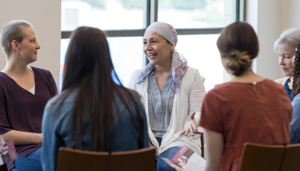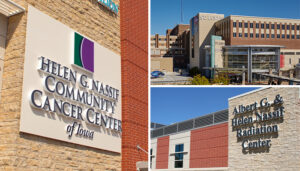The incidence of thyroid cancer in the U.S. has been increasing at a rate of five percent per year, making it the nation’s fastest-growing cancer. Ryan Dempewolf, MD, of Physician’s Clinic of Iowa Ear, Nose & Throat (ENT) says this increase is largely due to more sensitive imaging techniques. “Scans being done for other reasons, such as an ultrasound of the carotid artery, are picking up thyroid nodules at a very early stage,” explains Dr. Dempewolf. He adds, “We have a robust group of primary care physicians and specialists in Cedar Rapids who do an excellent job of following up on these findings.”
Nassif Community Cancer Center Director Kimberly Ivester says specialties including otolaryngology (ENT), radiation oncology and endocrinology collaborate to provide the highest standard of care for thyroid cancer patients. “Our work group of providers from multiple disciplines spent a full year developing protocols
for diagnosis and treatment of thyroid cancer. They established best practices for care coordination, standardized work-up and treatment protocols, and identified key services to provide psychosocial support and enhance quality of life.”
Ivester adds, “Nassif Community Cancer Center care coordinators ensure excellent communication and coordination between providers so patients are supported as they move through diagnosis and treatment. In addition to the providers and care coordinators, dietitians and social workers play an integral role with each patient.”
UnityPoint Health St. Luke’s Hospital provides the full spectrum of thyroid cancer treatment from diagnosis to surgery and radiation therapy including I-131 radioactive iodine. “Through the St. Luke’s Nassif Radiation Center, we provide I-131 radioactive iodine treatment so our patients don’t have to go outside the system for care,” observes Ivester. Genetic testing is also available. And follow-up care including thyroid hormone replacement is managed by Prasuna Rao (Madhavaram), MD, endocrinologist with UnityPoint Clinic Diabetes & Kidney Center.
Nine out of 10 thyroid cancers diagnosed at St. Luke’s in 2014 were stage I or II. Dr. Dempewolf notes early detection allows for more complete initial treatment and a lower risk of recurrence.
He adds, “Because the incidence of thyroid cancer is relatively high, there’s a lot of data available to us. We’ve learned you don’t always have to remove the entire thyroid. Smaller cancers found early give us the option of treating people less invasively and without the need for radioactive iodine, while still getting the same tremendous outcomes.”
Thyroid Cancer Facts
56,870 – Estimated new cases of thyroid cancer in U.S. in 2017.
98% – Five-year survival rate.
3 out of 4 – 75% of patients are women.
91% – Most thyroid cancers diagnosed at St. Luke’s were found in the earliest stages. *
*2014 data from the National Cancer Data Base







